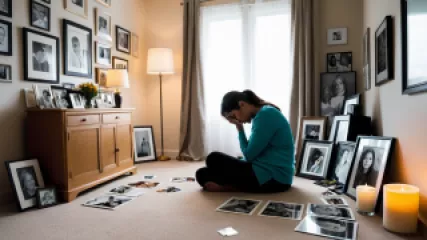My Personal Journey of Coping with Grief
Grief is a deeply personal and complex emotion that accompanies the loss of a loved one. It is a journey filled with ups and downs, twists and turns, and moments of profound sadness and healing. Each person's experience with grief is unique, shaped by their individual relationship with the person who has passed away and their own coping mechanisms.
In this opinion piece, I would like to share my personal journey of coping with grief, highlighting the different stages I went through and the strategies that helped me along the way. While my story may not resonate with everyone, I hope that it can provide some solace and guidance to those who are currently navigating the difficult path of grief.
The Initial Shock and Denial
When I first received the news of my loved one's passing, it felt as if the ground beneath me had crumbled. The initial shock was overwhelming, and I found myself unable to process the reality of the situation. Denial became my first coping mechanism, as I struggled to accept the loss and clung to the hope that it was all just a terrible mistake.
During this stage, I sought solace in the arms of my family and close friends. Their support and understanding provided a much-needed anchor in the storm of emotions that consumed me. Talking about my loved one and sharing memories with others helped to validate my feelings and began the process of acceptance.
Anger and Bargaining
As the shock started to subside, anger took its place. I felt angry at the unfairness of the situation, at the world for continuing to turn when my world had come crashing down. I lashed out at those around me, sometimes unfairly, as I grappled with the overwhelming sense of loss.
Bargaining also entered the picture during this stage, as I found myself pleading with a higher power to turn back time and undo the tragedy. "If only" and "what if" became recurring thoughts in my mind, as I desperately sought ways to change the outcome.
Recognizing the destructive nature of my anger and bargaining, I turned to grief counseling programs for support. These programs provided a safe space to express my emotions and connect with others who were going through similar experiences. The guidance and insights of the counselors helped me navigate the turbulent waters of anger and bargaining, gradually leading me towards acceptance.
Depression and Reflection
As the reality of the loss settled in, depression became a constant companion. I experienced overwhelming sadness, a loss of interest in activities I once enjoyed, and a sense of emptiness that seemed impossible to fill. It was during this stage that I began to reflect on the cherished moments I had shared with my loved one.
Engaging in self-care practices became essential for me during this period of intense sadness. I allowed myself to grieve, giving myself permission to feel the depths of my emotions. Journaling, meditation, and seeking professional grief support were vital components of my healing journey.
Finding Meaning and Acceptance
As time passed, I slowly started to find meaning within my grief. I discovered that the pain of loss could coexist with fond memories and love for my departed loved one. I began to honor their memory by engaging in acts of kindness, supporting causes that were important to them, and finding solace in sharing their story with others.
Acceptance also emerged during this stage, as I came to terms with the fact that my loved one was no longer physically present in my life. Although the ache of their absence remained, I found comfort in knowing that their spirit would forever live on in my heart and in the memories I cherished.
Conclusion
Grief is a deeply personal journey that cannot be rushed or avoided. It requires time, patience, and support to navigate its many complexities. While my personal journey of coping with grief may differ from yours, I hope that my experiences can offer some guidance and solace as you navigate your own path.
Remember that grief counseling programs, remote grief therapy, and the support of a grief support network can provide invaluable assistance during this challenging time. Seek professional grief counseling for loss if needed, and remember that you are not alone. Together, we can find healing, acceptance, and a renewed sense of purpose.






